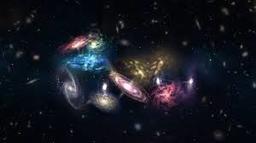
Universe and Solar system
Quiz by Shelby Finch
Feel free to use or edit a copy
includes Teacher and Student dashboards
Measure skillsfrom any curriculum
Measure skills
from any curriculum
Tag the questions with any skills you have. Your dashboard will track each student's mastery of each skill.
With a free account, teachers can
- edit the questions
- save a copy for later
- start a class game
- automatically assign follow-up activities based on students’ scores
- assign as homework
- share a link with colleagues
- print as a bubble sheet
26 questions
Show answers
- Q1The proper name for the planets that are solid and rocky compared to the others:Terrestrial Planets (rocky planets)45s
- Q2The proper name for the larger, gaseous, icy planets of the outer solar system.Jovian planets (gas giants)45s
- Q3The four planets closest to the Sun and inside the asteroid belt: Mercury, Venus, Earth, MarsInner planets45s
- Q4The four planets furthest from the Sun and outside the asteroid belt: Jupiter, Saturn, Uranus, NeptuneOuter planets45s
- Q5The spinning of Earth on its axisRotation30s
- Q6The elliptical motion of a body as it orbits another body in spaceRevolution30s
- Q7In this model of the solar system, an astronomer known as Copernicus proposed that the Sun is at the center of the solar system and celestial objects revolved around the sun. This is the correct model.Heliocentric Model60s
- Q8In this model of the solar system, an astronomer known as Ptolemy thought the Earth was in the center of the solar system.Geocentric Model60s
- Q9A large body in space that orbits a star and does not produce light on its ownPlanet45s
- Q10A natural satellite that revolves around a planet.Moon45s
- Q11The 1st planet in our solar system and the smallest planet.Mercury45s
- Q12The 4th planet from the Sun known for its red color.Mars30s
- Q13The 6th planet from Sun that is known for its spectacular rings. This gas giant is made mostly of hydrogen gas and ice/frosted rock.Saturn30s
- Q14The 7th planet from Sun and rotates on its side. It is a gas giant and has a blue-green color.Uranus30s
- Q15This planet is furthest from the sun and has the longest revolution of all the planetsNeptune30s